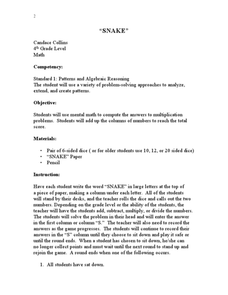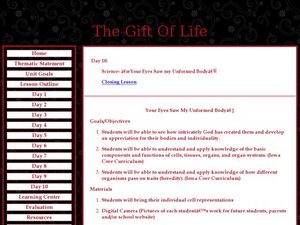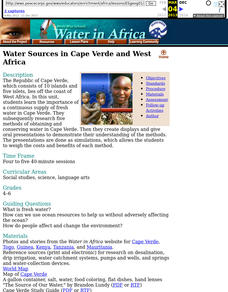Curated OER
Scissors Practice
In this hand-eye coordination worksheet, students practice using scissors to cut, following 4 patterned lines. Students are instructed to turn the paper as they cut jagged, straight and curvy lines.
Curated OER
Math Activity: "Snake"
Fourth graders explore patterns by participating in a class math activity. In this early algebra lesson, 4th graders utilize a die and chart to keep record of a snake game in which students must utilize a math function to solve a problem...
Curated OER
Body
In this body worksheet, students answer short answer questions about the functions of basic body parts. Students complete 10 problems total.
Curated OER
Body Organs: Matching
In this body organs worksheet, students match body organs with their functions. Students complete 19 matches total on this body organs worksheet.
Curated OER
Flowers: Form and Function
Students recognize and name the parts of a flower. They explain the function of each part of a flower. Students list the steps that occur for sexual reproduction of a plant to take place. They recognize and name the male reproductive...
Curated OER
Visual Impairment Based on a Children's Book
Young scholars explore practical information about visual impairment. They explore about the uses of seeing eye cane. Students explore the postive aspects about how people fucntion in spite of handicaps. They explore about helping...
Curated OER
Organizing Data
In this organizing data learning exercise, 7th graders solve seven different types of problems related to data. They first identify the type of data as categorical, discrete or continuous from the information given. Then, students use...
Curated OER
Body Parts
In this interactive human biology worksheet, students read ten riddles about body parts and type in the appropriate name of the body part the riddle is describing. Students also answer a nine word crossword puzzle that focuses on the...
Curated OER
Body Nouns Vocabulary Exercise
In this recognizing body parts and their functions worksheet, students read statements and choose the noun answers that they describe or define and then translate them. Students answer 20 questions.
Curated OER
Your Eyes Saw My Unformed Body: closing lesson
For those who teach and believe in Intelligent Design, this lesson plan is perfect. Religion students read and discuss Psalm 139: 1-18, and present their cell representation in class. They then watch a speech by Louie Giglio about the...
Inclusive Technology
Finger Paint With Sounds
Finger painting is fun, but finger painting with sounds is really fun. Finger painting is important for many reasons, it can help children develop a sense of creativity, foster social skills and emotional skills, it helps develop large...
Curated OER
Structure and Function of Bulbs, Corms and Rhizomes
Students explore the concept of philanthropy and why people give. They investigate the importance of the tulip to Holland and the tradition of giving flowers away. They begin to explore the life cycle of tulips and dissect a bulb to...
Curated OER
Water Sources in Cape Verde and West Africa
Young explorers study the scarcity and importance of a continuous supply of fresh water in Cape Verde. They research the five main ways that fresh water is obtained in these countries. Each research group prepares a presentation, and...
Curated OER
What are Igneous Rocks and How are They Formed?
Crystals form before your very eyes! What sixth grader wouldn't enjoy this lesson on igneous rock formation? Using hot Salol, junior geologists observe the crystal formation process as the material cools. This comprehensive lesson plan...
Curated OER
The Human Body
Explore the human body through hands-on activities. Young learners will trace their bodies and place cut out body organs in the proper place, print patterns using cut fruit, sing songs about good nutrition, and use their five senses...
Curated OER
Dissection Scramble
Students discover the anatomy of a human body by dissecting a cow's eye. In this animal dissection lesson, students identify the structure of an eyeball by cutting open a cow eye and observing the insides. Students participate in an...
Curated OER
Socratic Seminar Questions/Observation
Prepare participants for a Socratic seminar by asking them to not only design questions for the discussion, but to also observe an assigned partner during the seminar. A great way to encourage student-led discussions.
Curated OER
Variation and Heredity
Junior geneticists tally eye color and height in their lab groups. They examine certain traits in soybean and corn seedlings. For each activity, they gather data and learn about continuous and discontinuous genetic variation. In another...
Curated OER
Close Observation: Coins
Integrate math, science, and speaking/listening with a collaborative hands-on activity. Each group works with a single penny, examining it with the naked eye and recording observations. Repeat using magnifying glasses. Then repeat with a...
Curated OER
Relating to Girls Panels and Activity Cards
How can girls think and act differently than boys? The panels and cards provided here were designed to help learners, particularly teenage boys with high functioning autism, relate to teenage girls and consider the world from their...
DiscoverE
Squishy Circuits
Make electricity flow through Play-Doh. Individuals create animals or other creatures using Play-Doh. The engineering aspect? Eyes that light up and Play-Doh that conducts electricity.
Curated OER
Bug Snack
Students create an insect out of food. In this insect characteristics lesson, students review the 3 body parts of an insect and use various foods to create a sample insect. Students learn a song about insect body parts.
ARKive
Penguin Diversity – Mask Making
Penguins are very diverse and well-adapted birds; they live on islands, in warm and cold climates. Little ones examine penguin diversity and discuss the highly functional adaptive traits that have helped them survive in some of the...
American Museum of Natural History
Fighting Dinos
A famous fossil of fighting dinosaurs holds as many questions as answers. Scholars first analyze the fossil itself by virtually highlighting the specific bones of the dinosaurs and read about their function and importance. They then test...

























